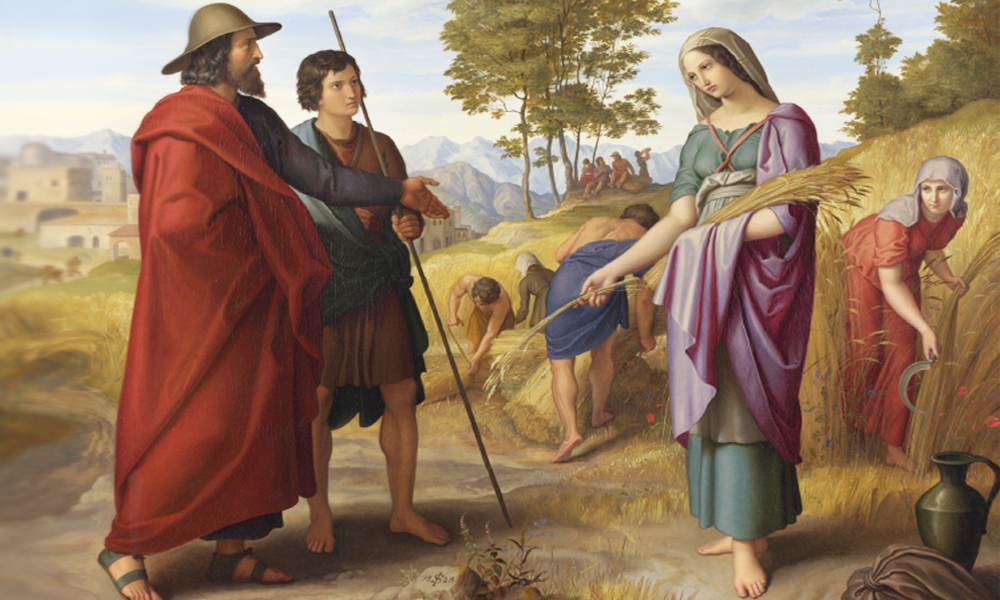
Love and loyalty run through the Book of Ruth
Wherever you go I will go, wherever you lodge I will lodge. Your people shall be my people and your God, my God. Where you die I will die, and there be buried. (Ruth 1:16-17)
Wherever you go I will go, wherever you lodge I will lodge. Your people shall be my people and your God, my God. Where you die I will die, and there be buried. (Ruth 1:16-17)
This oath was uttered by Ruth in response to Naomi’s (Ruth’s mother-in-law) repeated pleas that Ruth leave her. In refusing to go, Ruth would provide witness to the power of love and loyalty.
This oath was uttered by Ruth in response to Naomi’s (Ruth’s mother-in-law) repeated pleas that Ruth leave her. In refusing to go, Ruth would provide witness to the power of love and loyalty.
Call me “Mara”
Naomi had moved from Bethlehem to the plateau of Moab with her husband and two sons because of a famine. The Moab plateau was on the east side of the valley of Jordan. Its western-facing hills tended to get more rain than Judah and would, therefore, perhaps have promised better agricultural conditions. In time, Naomi’s sons would marry Moabite women, one of whom was Ruth.
However, Naomi soon lost her husband and sons. Having lost her entire family, she determined to return to Bethlehem. She told both her daughters-in-law to return to their family homes and begin life anew. She argued that they had no future with her, a widow, who would never marry again and who had no other sons to offer them in marriage. After some resistance, one acquiesced and left Naomi. Ruth refused to depart and pledged her undying loyalty to Naomi.
Upon arriving in Bethlehem, Naomi, which means “sweet,” informed the townspeople to call her Mara, which means “bitter.” Echoes of Job ring through this account as Naomi says, “I went away full, but the Lord has brought me back empty.” (Ruth 1:21) She was convinced that God’s favor no longer rested upon her.
From gleanings to redemption
Ruth began working the grain fields to gather the gleanings from anyone who would allow her. One day she happened to pick the field of Boaz, who actually was from the same clan as Naomi’s husband. Upon learning who she was, Boaz instructed her to glean only on his land. He explained that he knew of Ruth’s loyalty to Naomi and prayed that God would reward her fidelity.
Naomi was grateful for Boaz’s treatment of Ruth, who shared all the fruit of her work with Naomi. She was eager to do something for Ruth. She counseled Ruth to present herself to Boaz for marriage. Ruth executed Naomi’s plan, but Boaz believed there was a more fitting suitor (though he promised to marry Ruth if this other did not). As it turns out, the relative Boaz had in mind could not marry Ruth, so Boaz kept his word, which involved purchasing land held by Naomi’s late husband.
In doing so, Boaz acted as a redeemer (a term associated with the responsibilities of a circle of kinship) for Naomi as the transaction would provide her with financial support. In addition, Ruth would give birth to a son. Together, these two acts were hailed by the townspeople as evidence of God’s faithfulness to and blessing upon Naomi, a true restoration of her life granting her both financial and familial support in her old age (as Ruth’s son would undoubtedly be just as dedicated to Naomi as Ruth had been).
If this was not enough, Ruth’s son, Obed (or Oved), would become the father of Jesse, the father of King David. As the great-grandmother of King David, Ruth, the Moabite woman, became an ancestor in the messianic line that leads to Jesus.
In closing
The Book of Ruth paints a beautiful portrait of female friendship and support. The mutual love and loyalty demonstrated by Naomi and Ruth for each other helped them navigate tragic circumstances and emerge as iconic figures in the community and in history. In particular, Ruth’s generosity and willingness to leave her family and home behind to stay with Naomi combined with God’s saving action give the Book of Ruth its rightful place in the story of salvation.
Did You Know?
Ruth is the primary liturgical text in Judaism for the celebration of the Feast of Weeks (Shavuot). This is a major Jewish festival that commemorates the bringing of the first fruits of the harvest to the Temple and the giving of the Torah at Mount Sinai. Some also tie it to the birthday and death of King David, Ruth’s great-grandson, although this is not definitive or universal.
Doug Culp is the chancellor for the Catholic Diocese of Lexington.



